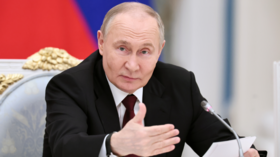Economies need to be weaned off debt
There will be no second wave of the financial crisis according to leading international economists gathered in Moscow. However, they say heavy government borrowing and debt must be reined in.
With GDP growth forecasts rising, inflation figures continuing to fall, and services and manufacturing activity indices showing both sectors getting traction on a rebound, the worst certainly appears past for the Russian economy.
Economists meeting in Moscow heard that at a global level, however, there is still doubt about the nature of the economic recovery, although there was little sentiment for a double dip recession. They say the economic downturn has triggered a global rebalancing, with emerging markets recovering faster and more strongly than the developed economies of North America and Europe.
The other key issue under notice was the role of the state. The trillions of dollars pumped into economies around the world, to ward off the prospect of a severe recession, or to bail out potentially bankrupt businesses, have left global taxpayers funding massive deficits and economies more reliant than they have been in more than a generation on government stimulus measures.
Klaus Zimmermann, Professor of Economics at Bonn University, says the state response to the passing crisis means the sting in the tail for many economies will be the need to save.
“We have overdone the role of the state in the past crisis. We have created a substantial deficit in many countries around the world and these deficits put a lot of pressure on governments and on financial markets. We have to save money and let the markets work again.”
Herman Gref, the former Economic Development Minister now heading Sberbank, is confident there will be no further dip into recession. He believes that in Russian lending may grow by up to 10 percent this year with investors regaining interest in Russia. But he also believes that economic imbalances, which haven’t been addressed during the economic downturn, mean the outlook could be turbulent.
“The instability will be connected with macroeconomic volatility. The very high level of state debt, and the budget deficit accumulated during the crisis, has caused an economic imbalance. And this of course will spark fluctuations on the currency markets. Inflation also brings a lot of risks: if it keeps bouncing, all the financial indicators in the country will change.”
Despite inflation falling to 6.5% in March, Finance Minister Alexey Kudrin is also wary, warning that when economic indicators are more clearly showing strong growth Russia is at risk of ‘accelerating inflation.’ He notes that with government expenditure increasing four fold in the past decade and with the government currently in control of an estimated 50% of the economy the state needs to curtail spending, and that there will be no state spending growth for 10 years.
"After a four-fold increase in budget spending, we'll have a ten-year period without expenditure growth," adding “This is a serious challenge. It means we won’t be able to hand out money as before.”
The Finance Ministry is targeting a 20% real reduction in spending by 2015, with an expenditure cap at current levels until 2020. Importantly, Kudrin believes “Risks of a second recession remain,” with inflationary pressure possibly forcing governments to tighten monetary policy and withdraw stimulus measures.











